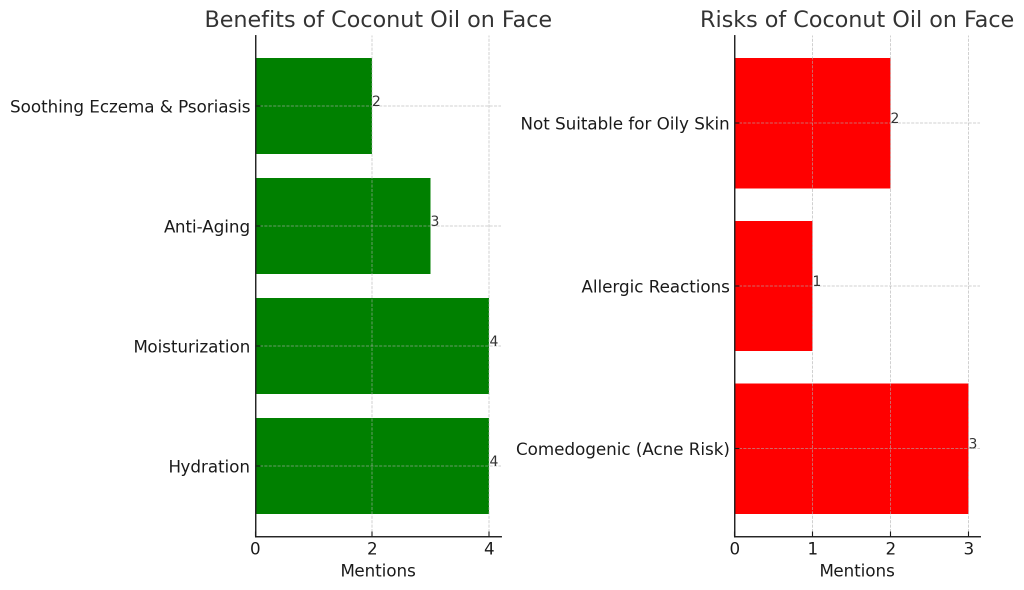Key Takeaways Table
| Aspect | Detail |
|---|---|
| Primary Benefit | Hydration and Moisturizing |
| Skin Types Benefited | Dry, Eczema-prone, Psoriasis-affected |
| Potential Risks | Comedogenic (Can clog pores leading to acne) |
| Anti-Aging Properties | Contains antioxidants to prevent premature aging |
| Effect on Wrinkles | Boosts collagen, reduces fine lines |
Understanding the Impact of Coconut Oil on Facial Skin
Coconut oil is a versatile and natural product with various uses and benefits, especially for skincare. Its application on the face, however, can have mixed effects depending on skin type and usage.
The Hydration Power of Coconut Oil
Coconut oil is exceptionally hydrating due to its high saturated fat content, which helps control water loss in the skin’s top layer. This quality is beneficial for maintaining the health of the skin’s protective barrier and locking in moisture, ensuring the skin remains hydrated and supple. People with conditions like eczema, rosacea, or dermatitis can benefit from its ability to decrease transepidermal water loss (TWL).
Moisturization and Skin Barrier Enhancement
Research indicates that coconut oil is not only super moisturizing but also improves skin barrier function. This is particularly soothing for those with skin conditions such as eczema and psoriasis.
Risks for Certain Skin Types
However, it’s important to note that coconut oil is highly comedogenic. This means it can clog pores and potentially increase the appearance of blackheads, whiteheads, and acne, especially in individuals with oily or acne-prone skin.
Anti-Aging and Wrinkle Reduction
Coconut oil contains antioxidants that protect the skin from free radical damage, which can lead to premature aging. It also boosts collagen production, which is essential in reducing the appearance of fine lines and wrinkles, making it a natural anti-aging solution.
Tables and Lists for Enhanced Understanding
Pros and Cons of Coconut Oil on Face
| Pros | Cons |
|---|---|
| Hydrates and moisturizes skin | Can clog pores in oily skin |
| Improves skin barrier function | Might trigger acne in acne-prone skin |
| Antioxidant-rich, anti-aging | |
| Reduces fine lines and wrinkles |
Ideal Usage Tips for Coconut Oil on Face
- For Dry Skin: Apply a thin layer to retain moisture.
- For Eczema or Psoriasis: Use as a soothing agent.
- Avoid on Oily Skin: To prevent pore clogging and acne.
- As an Anti-Aging Treatment: Regular application can reduce signs of aging.
The Comedogenic Concern: Coconut Oil and Acne
When discussing coconut oil’s effect on the face, it’s crucial to address its comedogenic properties. Being highly comedogenic, coconut oil can clog pores, which might exacerbate acne issues in individuals with oily or acne-prone skin. This could lead to an increased appearance of blackheads and whiteheads. Understanding your skin type and its compatibility with coconut oil is essential before incorporating it into your skincare routine.
How Coconut Oil Fits into Your Skincare Regimen
For Dry and Sensitive Skin Types
Given its hydrating and moisturizing properties, coconut oil can be a boon for those with dry and sensitive skin. It can fill in the cracks in the skin’s surface and lock in moisture, leading to softer and more supple skin.
Caution for Oily and Acne-Prone Skin
Due to its potential to clog pores, individuals with oily and acne-prone skin should exercise caution. It’s advisable to conduct a patch test or consult a dermatologist before using coconut oil on the face.
The Overnight Magic: Coconut Oil for Anti-Aging
Applying coconut oil overnight can have remarkable effects on reducing the signs of aging. Its antioxidants protect the skin from damage while boosting collagen production, helping diminish fine lines and wrinkles. For those seeking a natural anti-aging solution, coconut oil offers a compelling choice.

These charts offer a balanced view, emphasizing that while coconut oil has multiple skin benefits, it also carries certain risks that should be considered, especially for individuals with specific skin types and concerns.
Additional Considerations
Table: Recommended Use Based on Skin Type
| Skin Type | Recommendation |
|---|---|
| Dry and Sensitive | Highly recommended for hydration |
| Oily and Acne-Prone | Use with caution, may cause clogging |
| Mature Skin | Beneficial for anti-aging properties |
List: Do’s and Don’ts of Using Coconut Oil on Face
- Do’s:
- Use as a night cream for dry skin.
- Apply as a treatment for eczema or psoriasis.
- Utilize its anti-aging benefits.
- Don’ts:
- Don’t overuse on oily skin.
- Avoid if prone to acne breakouts.
- Be cautious of potential allergic reactions.
The Role of Coconut Oil in Skin Health: A Closer Look
Coconut oil’s role in skincare is multifaceted, offering benefits that range from moisturizing dry skin to potentially helping with certain skin conditions. However, its effectiveness and suitability can vary greatly depending on individual skin types and concerns.
Addressing Specific Skin Concerns with Coconut Oil
- Eczema and Psoriasis: The soothing properties of coconut oil can be particularly beneficial for individuals suffering from eczema and psoriasis. Its ability to enhance the skin barrier function makes it a suitable option for managing these conditions.
- Aging Skin: For those concerned with signs of aging, coconut oil’s antioxidants and collagen-boosting properties can be a natural alternative to more intensive skincare treatments.
Understanding the Limitations and Risks
While coconut oil has numerous benefits, it is not without its limitations and risks, particularly for certain skin types.
Comedogenic Nature and Acne Risk
The comedogenic nature of coconut oil means it has the potential to clog pores, which can be detrimental for those with acne-prone skin. The increase in blackheads, whiteheads, and acne is a risk that cannot be overlooked.
Allergic Reactions and Skin Sensitivity
As with any natural product, there’s always a possibility of allergic reactions or skin sensitivity. It’s important to conduct a patch test before fully integrating coconut oil into your skincare routine.
Final Recommendations and Considerations
Table: Summary of Coconut Oil Usage for Different Skin Concerns
| Skin Concern | Recommendation |
|---|---|
| Dry Skin | Beneficial for hydration |
| Eczema and Psoriasis | Useful for soothing and treatment |
| Oily and Acne-Prone Skin | Use with caution due to comedogenicity |
| Aging Skin | Effective for anti-aging properties |
Final Tips for Using Coconut Oil on Face
- Patch Test: Always conduct a patch test before applying coconut oil to your entire face.
- Moderation is Key: Use in moderation, particularly if you have oily or acne-prone skin.
- Consult a Dermatologist: For personalized advice, especially if you have skin conditions or concerns.
The use of coconut oil on the face can be a natural and effective way to address various skin concerns. However, its effectiveness is highly dependent on individual skin types and conditions. By understanding its benefits and risks, one can make an informed decision about incorporating coconut oil into their skincare regimen.

